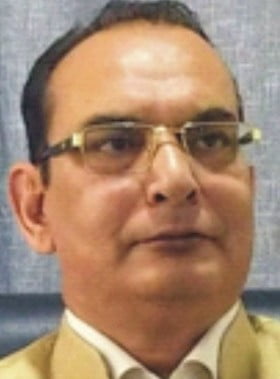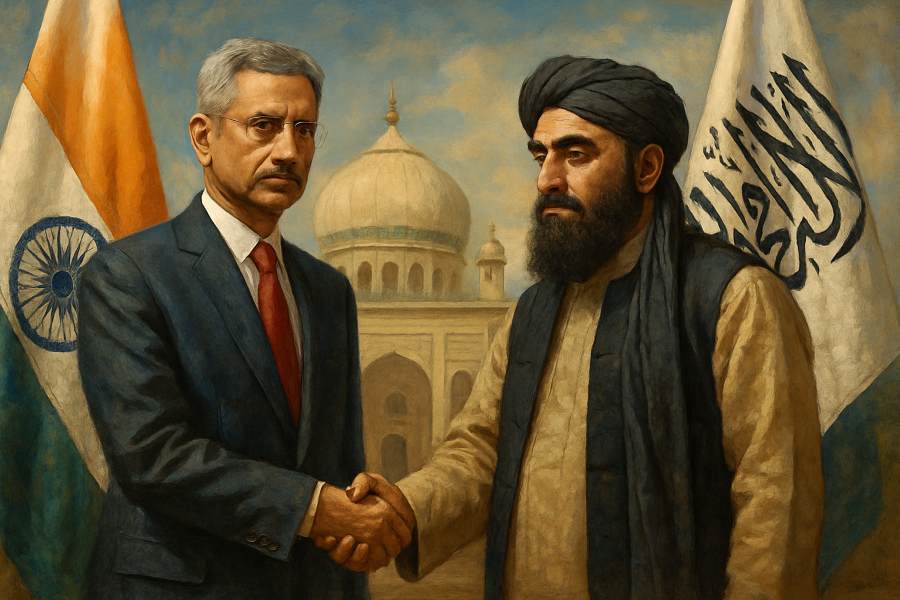The Afghan foreign minister’s India trip, including a stop at Darul Uloom Deoband, signals a nuanced shift in regional diplomacy and perceptions.
AFGHANISTAN’S ACTING Foreign Minister, Amir Khan Muttaqi, is on a seven-day visit to India. The visit assumes significance as it marks the first high-level visit by any Afghan official to India since the Taliban-led government, the Islamic Emirate of Afghanistan, was proclaimed in August 2021, following the abrupt and hasty withdrawal of American forces from the country.
Muttaqi, who arrived in New Delhi on Friday (October 10), held a meeting with India’s Foreign Minister S. Jaishankar in the national capital. In a post on X, Jaishankar said that the Afghan minister’s visit marks an “important step in advancing our ties and affirming the enduring India–Afghanistan friendship.”
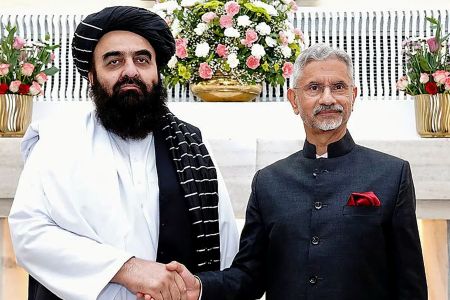
Amir Khan Muttaqi with S. Jaishankar
India’s relations with Afghanistan are now warming again under the second Taliban government. Although India has not yet officially recognised the Taliban regime, the Afghan foreign minister’s visit signals strategic engagement for both countries.
Muttaqi’s maiden visit to India was marked by India restoring full diplomatic relations with Afghanistan. New Delhi will also upgrade its Technical Mission in Kabul to an embassy, Jaishankar said during his meeting with Muttaqi, asserting India’s “deep interest” in the progress of its neighbouring country.
Terror groups like Lashkar-e-Taiba and Jaish-e-Mohammad have long operated from Afghan soil. However, the Taliban has eliminated all terrorists over the last four years, claimed Muttaqi during his India visit, advising Pakistan to follow the same path of peace.
He also had a message for Pakistan, delivered from Indian soil—a country that has long been a victim of cross-border terrorism: “Let other countries also act against such terror groups, as Afghanistan did for peace.”
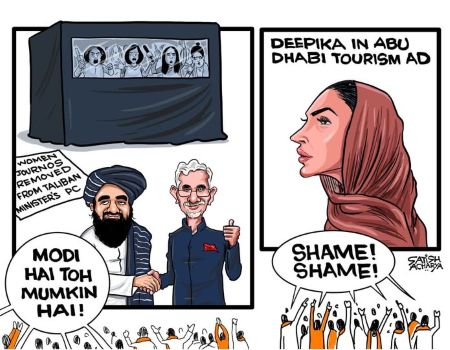 In his press conference, Muttaqi addressed reports of a recent blast in Kabul and accused Pakistan of orchestrating the act.
In his press conference, Muttaqi addressed reports of a recent blast in Kabul and accused Pakistan of orchestrating the act.
He warned that the courage of Afghans should not be tested. “If someone wants to cause Afghans trouble, they should ask the Soviet Union, America, and NATO. They will explain that it is not good to play games with Afghanistan,” the minister said. Kabul, he added, also wants better relations with Islamabad, but they cannot be one-sided.
Speaking about relations with India, he praised New Delhi for being the first responder after the recent earthquake in Afghanistan.
“Afghanistan looks at India as a close friend. Afghanistan wants relations based on mutual respect, trade, and people-to-people ties. We are ready to create a consultative mechanism of understanding to strengthen our relations,” said the visiting minister.
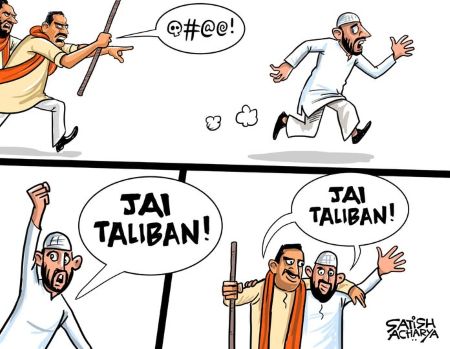 Sending Pakistan a tough message from New Delhi, Muttaqi said: “The policy of the Islamic Emirate of Afghanistan is to resolve all problems through discussion and understanding. We want to have zero tension, and if others don’t want that, then Afghanistan has other means.”
Sending Pakistan a tough message from New Delhi, Muttaqi said: “The policy of the Islamic Emirate of Afghanistan is to resolve all problems through discussion and understanding. We want to have zero tension, and if others don’t want that, then Afghanistan has other means.”
His remarks came a day after Pakistan summoned the Taliban ambassador to convey its “strong reservations” over the India–Afghanistan joint statement issued in New Delhi, in which Kabul strongly condemned the terrorist attack in Pahalgam in April this year.
“We have good relations with the people and government of Pakistan, but some elements in that country are trying to create problems,” Muttaqi said.
Meanwhile, Muttaqi’s India visit was marred by two unrelated and unsavoury incidents.
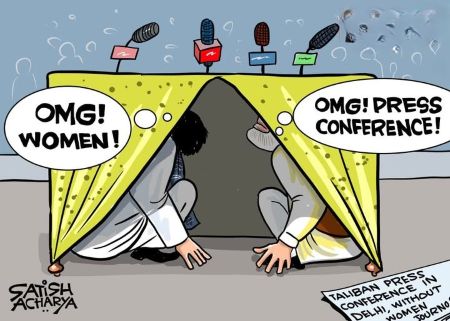
Courtesy: South First
The first involved the exclusion of women journalists from his press conference in New Delhi. Following an uproar from the journalistic community, Afghan officials convened another press conference to undo the damage, inviting women journalists as well.
This questionable decision may have stemmed from the Taliban’s strict policy against involving women in the public sphere, but in this case, a more pragmatic approach respecting the norms of the host country should have been taken.
The second issue that attracted considerable attention was Muttaqi’s visit to Darul Uloom Deoband, the highest seat of Islamic learning in India, often described as the Al-Azhar (the oldest and most influential Sunni Islamic seminary in the world) of the East.
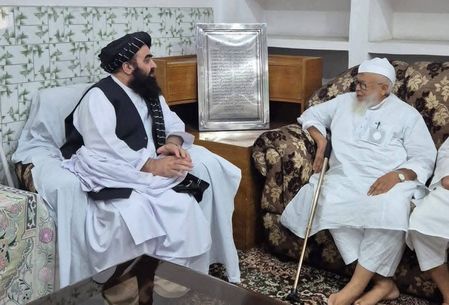
Amir Khan Muttaqi Visited Darul Uloom
Critics questioned why Muttaqi visited Darul Uloom, which is often unfairly maligned as an institution spreading Wahhabism among Indian Muslims—an accusation far from the truth.
However, critics should also note that before visiting Darul Uloom, Muttaqi attended an event in New Delhi organised by the Vivekananda International Foundation (VIF), a think tank known for its links to the RSS.
VIF, founded in 2009 under the aegis of the Vivekananda Kendra—a spiritual organisation established by Eknath Ranade, a prominent RSS leader in the 1970s—is considered an RSS affiliate. The event was well-attended by diplomats, security experts, and leading political and defence commentators.
So, if Muttaqi had no hesitation in attending an event at an RSS-affiliated institution, why should there be a hue and cry over his visit to Darul Uloom?
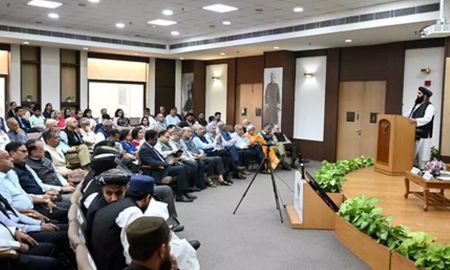
Muttaqi attending an event in New Delhi organised by the Vivekananda International Foundation, a think tank known for its links to the RSS.
Before criticising, it would be better for detractors to get their facts right about both Darul Uloom and Afghanistan.
It is a well-known fact that before 1980—prior to the promulgation of a central law barring foreign students in India—a large number of students at Darul Uloom came from Afghanistan, Bangladesh, Myanmar, and other Central Asian republics.
Darul Uloom has long held the highest reputation among centres teaching moderate Islamic theology in South Asia.
In fact, many teachers (Ustaads) of some recent Taliban leaders studied at Darul Uloom, spreading messages of moderation and tolerance among their disciples in Afghanistan, Pakistan, and elsewhere.
Additionally, historical ties between Afghanistan and India date back centuries. Even in the last century, Afghanistan provided safe haven to Indian freedom fighters.
The first Indian government-in-exile, the Provisional Government of India, was established in Kabul on December 1, 1915, led by President Raja Mahendra Pratap and Prime Minister Maulana Barkatullah.
Furthermore, the Silk Letter Conspiracy (1913–1920), led by Deobandi scholars during India’s independence movement, aimed to overthrow British rule through alliances with Germany, Turkey, and Afghanistan.
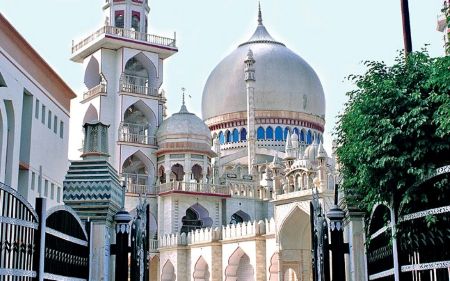
Darul Uloom
The conspiracy, named for letters written on silk cloth used for secret communication, was eventually intercepted by the British.
Leaders like Maulana Mahmud Hasan and Maulana Obaidullah Sindhi were central figures in this effort, which ultimately failed but remains a significant chapter in India’s freedom struggle.
I have written in detail about these two historical events in my book Demystifying Madrasah and Deobandi Islam.
Muttaqi’s visit to India should be acknowledged as a pragmatic and well-intentioned move by both the Indian and Afghan leaderships. It may help stabilise the region while further isolating Pakistan. ![]()
_________
Also Read:
Politics, Prices, and the People’s Pain
Disclaimer : PunjabTodayNews.com and other platforms of the Punjab Today group strive to include views and opinions from across the entire spectrum, but by no means do we agree with everything we publish. Our efforts and editorial choices consistently underscore our authors’ right to the freedom of speech. However, it should be clear to all readers that individual authors are responsible for the information, ideas or opinions in their articles, and very often, these do not reflect the views of PunjabTodayNews.com or other platforms of the group. Punjab Today does not assume any responsibility or liability for the views of authors whose work appears here.
Punjab Today believes in serious, engaging, narrative journalism at a time when mainstream media houses seem to have given up on long-form writing and news television has blurred or altogether erased the lines between news and slapstick entertainment. We at Punjab Today believe that readers such as yourself appreciate cerebral journalism, and would like you to hold us against the best international industry standards. Brickbats are welcome even more than bouquets, though an occasional pat on the back is always encouraging. Good journalism can be a lifeline in these uncertain times worldwide. You can support us in myriad ways. To begin with, by spreading word about us and forwarding this reportage. Stay engaged.
— Team PT
